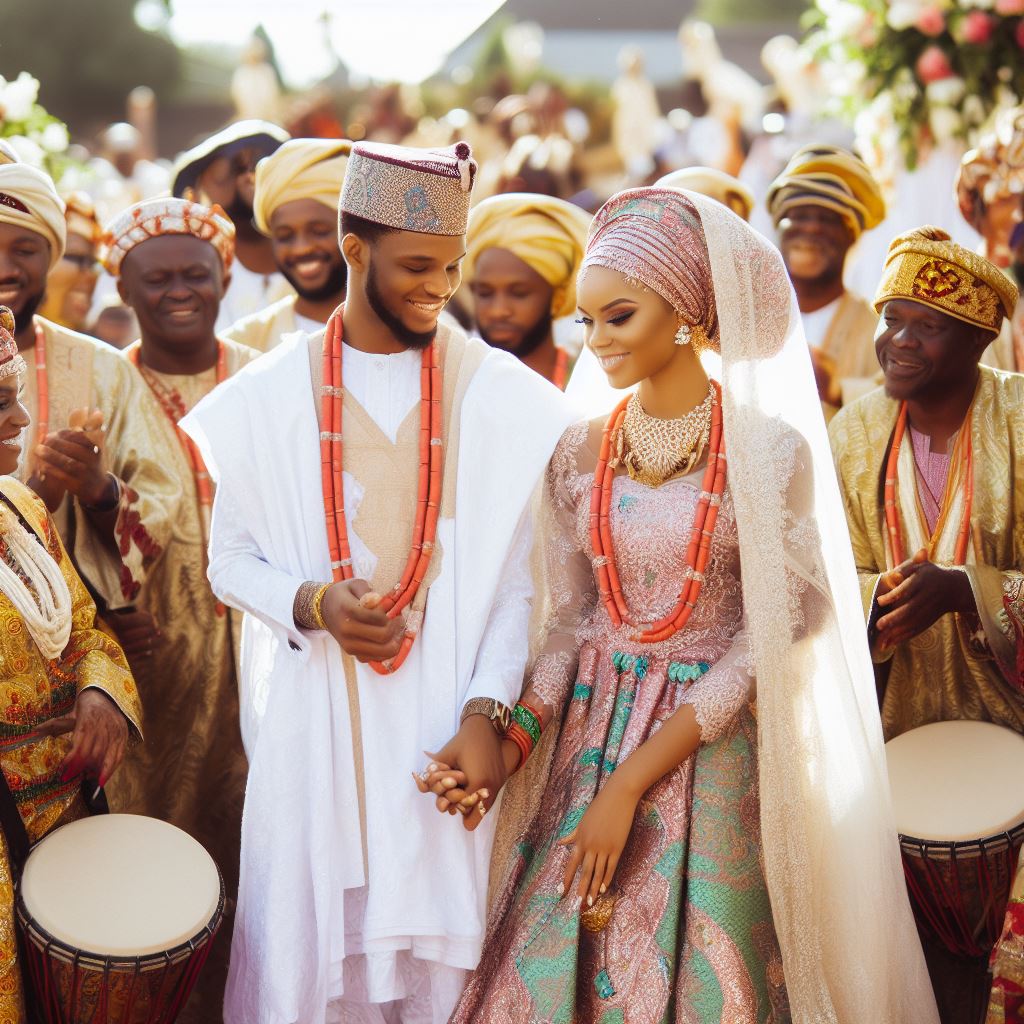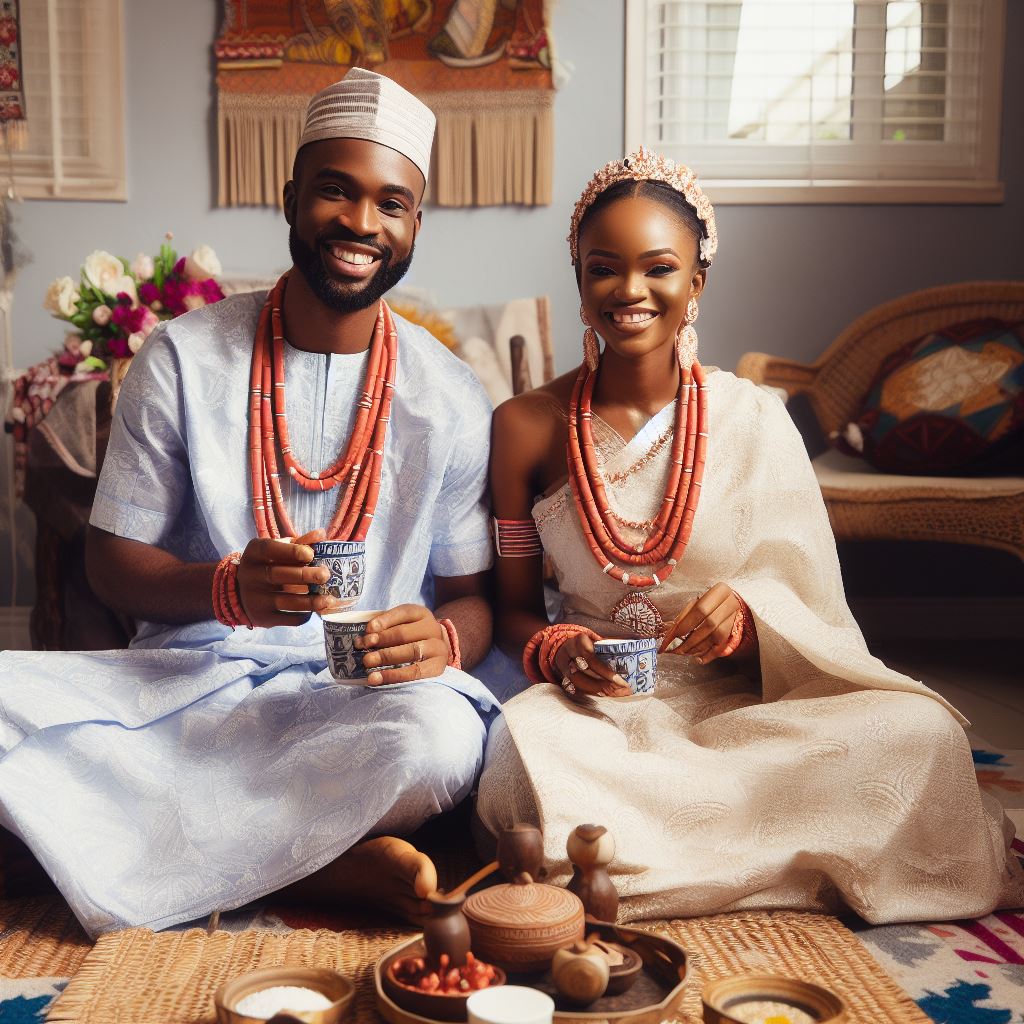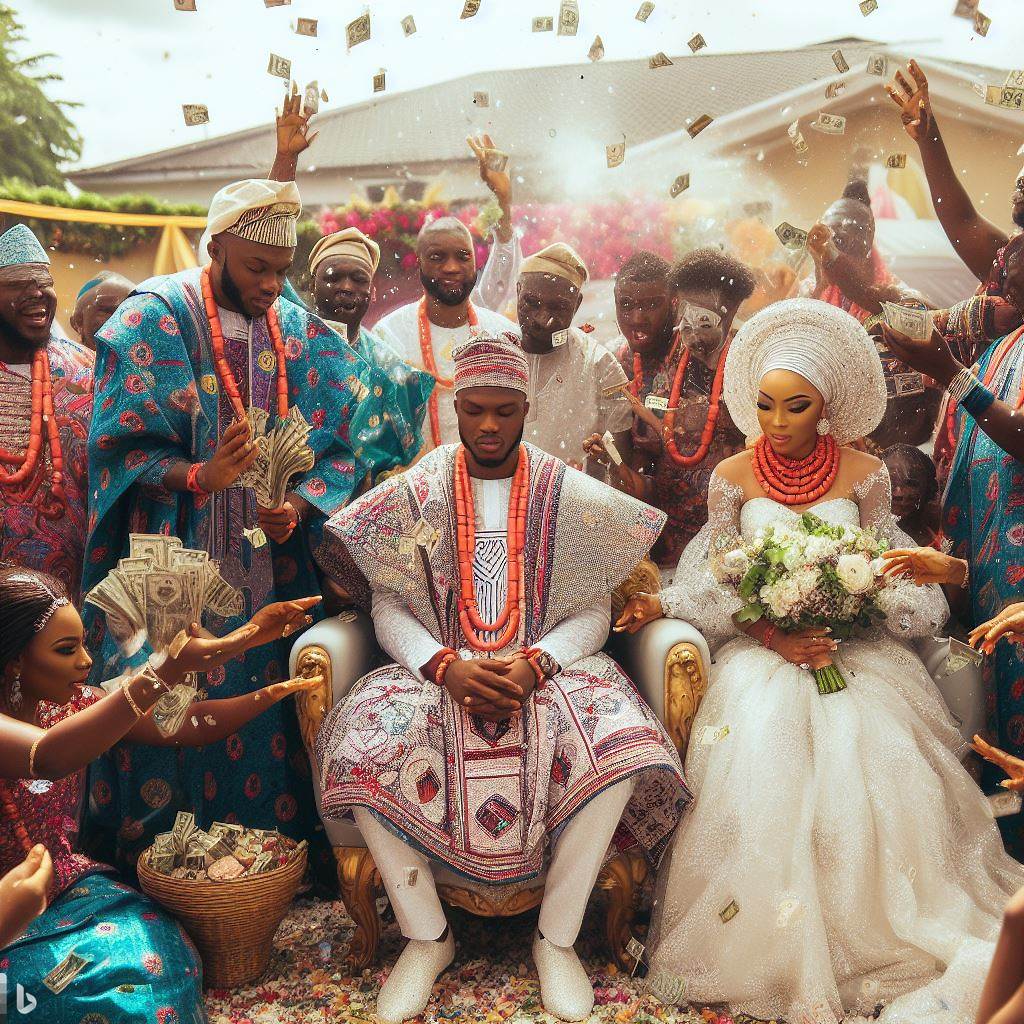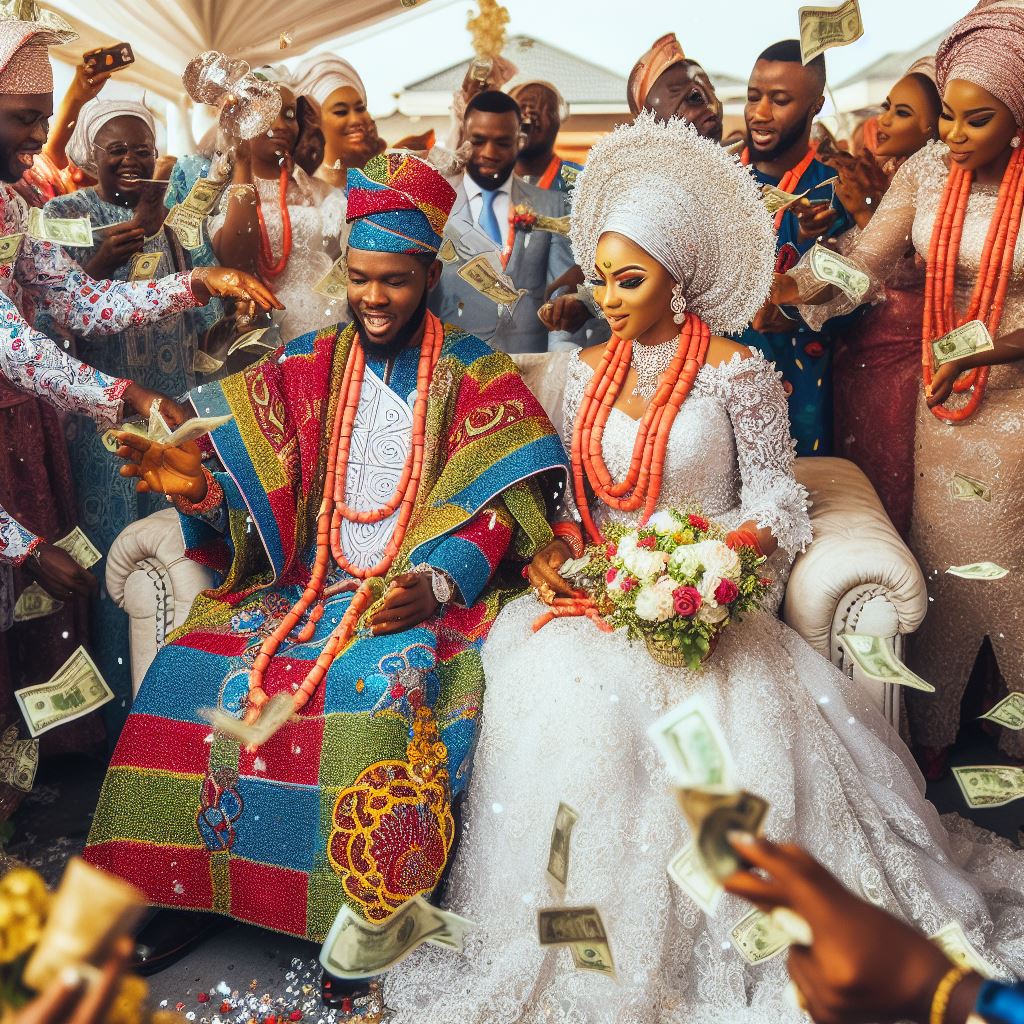Introduction
Traditional marriages in Nigeria hold unique and intricate cultural significance for the diverse ethnic groups in the country.
Igbankwu is a traditional marriage ceremony that stands out among the Igbo people, revealing their rich customs and traditions.
Overview of traditional marriages in Nigeria
Nigeria’s traditional marriages deeply root in cultural practices, exhibiting diverse rituals, attire, and symbolism.
These marriages serve as a way to unite families, preserve cultural values, and strengthen community ties.
Focus on Igbankwu, the traditional marriage ceremony of the Igbo people
Characterized by grandeur and attention to detail, Igbankwu represents a traditional Igbo marriage ceremony.
It involves elaborate processes that reflect the Igbo cultural heritage and emphasize the union between two families.
The Igbankwu ceremony commences with the introduction of the groom’s family to the bride’s parents, showcasing respect and the desire for the union.
Negotiations then take place, involving the payment of bride price and the agreement on other marital responsibilities.
On the wedding day, the couple dresses in traditional Igbo attire, adorned with intricate beading, vibrant colors, and symbolic motifs.
The bride wears a traditional headgear, while the groom dons a traditional isiagu shirt, displaying his status and readiness for marriage.
During the ceremony, the couple participates in various rituals, such as the exchange of kolanuts, pouring of libations, and breaking of the calabash to signify the end of any potential conflicts in the marriage.
Music, dance, and feasting are integral parts of Igbankwu, with traditional Igbo instruments and cultural performances adding to the vibrant atmosphere of the celebration.
Igbankwu showcases the deep-rooted cultural practices and values of Igbo traditional marriages, passed down through generations with significance.
It remains a cherished ceremony that brings communities together and serves as a testament to the richness of Nigerian cultural heritage.
History and Significance of Igbankwu
The origins and historical background of Igbankwu
Igbankwu, also known as Igbo traditional marriages, have a rich history and cultural significance in Igbo society.
Igbo people hold these marriages dear, deeply rooted in their traditions and customs, occupying a special place in their hearts. Let’s delve into the history and significance of Igbankwu.
Igbankwu’s origins trace back to ancient times when the Igbo people settled in their homeland. While not well-documented, it’s believed practiced for centuries.
The cultural and social importance of Igbankwu in Igbo society
It is important to understand that Igbankwu is not just a union between two individuals but also a union between two families.
This unique aspect makes Igbankwu a significant event that involves the entire community. The families of the bride and groom come together to celebrate and bless the union.
Igbankwu’s cultural significance is paramount, showcasing and celebrating Igbo traditions, customs, and values with colorful attire, lively music, dances, and feasts.
Igbankwu serves as a platform for the preservation and promotion of Igbo culture.
During the ceremony, participants perform traditional rites and rituals, emphasizing the need to preserve these customs’ significance.
Moreover, Igbankwu plays a vital role in social cohesion within Igbo society.
It strengthens the bond between families and communities, as they come together to support and celebrate the couple embarking on their journey of marriage.
Lists of some significant aspects of Igbankwu
- Bridal Price: One important aspect of Igbankwu is the payment of a bride price by the groom’s family to the bride’s family. This symbolizes respect, appreciation, and recognition of the bride’s worth.
- Traditional Attire: Both the bride and groom wear traditional Igbo attire during the ceremony.
The bride adorns herself with a beautiful handmade wrapper and blouse, complemented by intricate beadwork and accessories.
The groom wears a traditional men’s outfit, which typically includes a flowing robe and a cap. - Traditional Ceremonies: Igbankwu involves a series of traditional ceremonies, including the introduction ceremony, where the groom officially declares his intention to marry the bride.
Other ceremonies include the wine-carrying ceremony, the exchange of vows, and the breaking of kola nuts, which symbolizes hospitality. - Igbo Dance and Music: Igbankwu is incomplete without lively Igbo dances and music.
Traditional instruments like the gong, flute, and drum produce captivating rhythms, while dance steps exhibit the Igbo people’s rich cultural heritage. - Feasting and Celebration: Igbankwu is a time of joyous celebration.
Friends, family, and community members come together to enjoy a lavish feast, which includes delicious Igbo delicacies such as pounded yam, egusi soup, and palm wine.
Igbankwu holds a significant place in Igbo society due to its historical roots and cultural importance.
This beautiful tradition serves as a means of preserving Igbo customs, strengthening familial bonds, and promoting social cohesion.
Igbankwu is a celebration of love, culture, and community, and it continues to be cherished by the Igbo people through generations.
Preparations and Rituals
The various steps involved in preparing for an Igbankwu ceremony
Igbankwu, also known as the Igbo traditional marriage ceremony, is a significant event that showcases the rich cultural heritage of the Igbo people.
It involves various steps and rituals that bring together the families of the bride and groom, as well as the entire community.
In this section, we will explore the different stages of preparing for an Igbankwu ceremony and discuss the traditional rituals that make it a unique and unforgettable celebration.
Firstly, the preparations for an Igbankwu ceremony begin long before the actual day of the event. The families of the bride and groom come together to plan and organize every aspect of the ceremony.
This includes setting the date, budgeting for the event, and making arrangements for the venue, catering, and decorations. It is a collaborative effort that involves close coordination between both families.
Traditional rituals
The first traditional ritual that takes place is called “Iko Ndi Nne.” This is the stage where the groom and his family seek the consent of the bride’s family for the marriage to take place.
The groom’s family, along with close relatives and a few friends, visit the bride’s family to formally express their intention to marry their daughter.
This ritual symbolizes the unity and commitment between both families. It is essential for the bride’s family to give their consent before proceeding with the ceremony.
Once the bride’s family has given their consent, the next significant step is the “Igba Nkwu” ceremony, also known as the engagement ceremony.
This ritual marks the official engagement of the couple in front of their families and community.
During this ceremony, the groom’s family presents gifts, including kola nuts, wine, and palm wine, to the bride’s family.
This gesture is a way of showing respect and appreciation to the bride’s family for accepting the groom into their family. It is a joyous occasion filled with music, dance, and laughter.
Apart from these two major rituals, several smaller but equally important traditional rituals are carried out during an Igbankwu ceremony.
Rituals encompass bride price negotiation, where families agree on the bride price, exchanging vows and rings by the couple, and breaking the kola nut signifying unity and shared future.
Each ritual has its significance and contributes to the overall beauty and symbolism of the Igbankwu ceremony.
Read: The Beauty of Commitment: Top Bible Verses on Marriage
Attire and Adornments
In Igbo traditional marriages, the attire worn by the bride, groom, and guests during Igbankwu ceremonies is rich in cultural significance and symbolism.
Traditional Igbo Attire
The bride typically wears a vibrant, luxurious fabric called the george wrapper, which she ties around her waist, reaching her ankles.
She also wears a blouse, often made of lace or embroidered fabric, featuring intricate patterns and designs.
The groom typically wears a traditional isiagu, a shirt made of patterned fabric that represents strength and masculinity.
He pairs it with a matching etibo, which is a wrapper tied around the waist.
Guests attending the Igbankwu ceremonies also show off their vibrant outfits, often wearing traditional Igbo attire such as isiagu shirts or george wrappers.
These garments are carefully crafted to showcase the cultural heritage and identity of the Igbo people.
Symbolism of Attire
The different elements of the attire worn during Igbankwu ceremonies have deep symbolic meanings.
Coral beads, known as igi ji mmiri, hold great significance in Igbo culture and are commonly worn by the bride on her wedding day.
These beads symbolize fertility, wealth, and protection for the couple. They are believed to bring good luck and blessings to the newlyweds.
Another essential element of the bride’s attire is the okpu agu, a traditional Igbo hat worn as a sign of respect.
This hat represents the bride’s transition from a young girl to a married woman. It also signifies her readiness to take on the responsibilities of marriage.
The fabric used for the bride and groom’s attire is carefully chosen and holds symbolic significance. The vibrant colors and intricate patterns represent beauty, prosperity, and happiness.
They also reflect the couple’s pride in their cultural heritage and their desire to celebrate it on their special day.
During Igbankwu ceremonies, the attire and adornments worn by the bride, groom, and guests create a visually stunning display of Igbo culture.
They not only represent the couple’s personal style choices but also serve as a way to honor their heritage and showcase their identity.
The cultural significance of the attire in Igbo traditional weddings is a testament to the beauty and depth of Igbo traditions and customs.
It adds an extra layer of meaning and celebration to the joyous union of two individuals and their families.
The attire in Igbankwu ceremonies exemplifies the beauty and richness of Igbo traditional marriages, featuring exquisite coral beads, regal isiagu shirts, and colorful fabrics worn by guests.
Read: Grace, Love, and Unity: Biblical Keys for Marriage
Traditional Ceremonial Practices
Traditional practices and customs observed during Igbankwu ceremonies
- Exchange of Gifts: During Igbankwu ceremonies, the exchange of gifts holds great importance.
- Ceremonial Dances: Traditional dances are an integral part of Igbankwu ceremonies, expressing joy and celebration.
- Prayers: Prayers are offered to seek blessings from the ancestors and ensure a successful union.
Significance of these practices
- Strengthening Family Bonds: The exchange of gifts symbolizes the unity and support of both families involved in the marriage.
- Building Community Ties: Igbankwu ceremonies bring communities together, fostering a sense of togetherness and cooperation.
- Honouring Ancestors: The prayers offered during the ceremony pay homage to the ancestors, seeking their blessings for a harmonious marriage.
The Igbankwu ceremony, deeply rooted in Igbo culture, showcases a range of unique traditional practices and customs.
These practices include the exchange of gifts, ceremonial dances, and prayers, all carried out with the aim of strengthening family bonds and community ties.
The exchange of gifts holds significant meaning in Igbo traditional marriages.
It is not simply the act of exchanging material items but rather a symbol of unity and support between the families involved.
The gifts exchanged may vary, ranging from monetary offerings to valuable items that hold cultural significance.
This gesture represents the families’ commitment to being there for one another throughout the couple’s journey together.
Igbankwu ceremonies exemplify the beauty of Igbo traditional marriages through various ceremonial practices.
The exchange of gifts, ceremonial dances, and prayers all serve to strengthen family bonds and community ties.
These practices not only celebrate the couple’s union but also honor the rich cultural heritage and ancestral traditions of the Igbo people.
Read: From Adam and Eve: Lessons on Marriage in the Bible
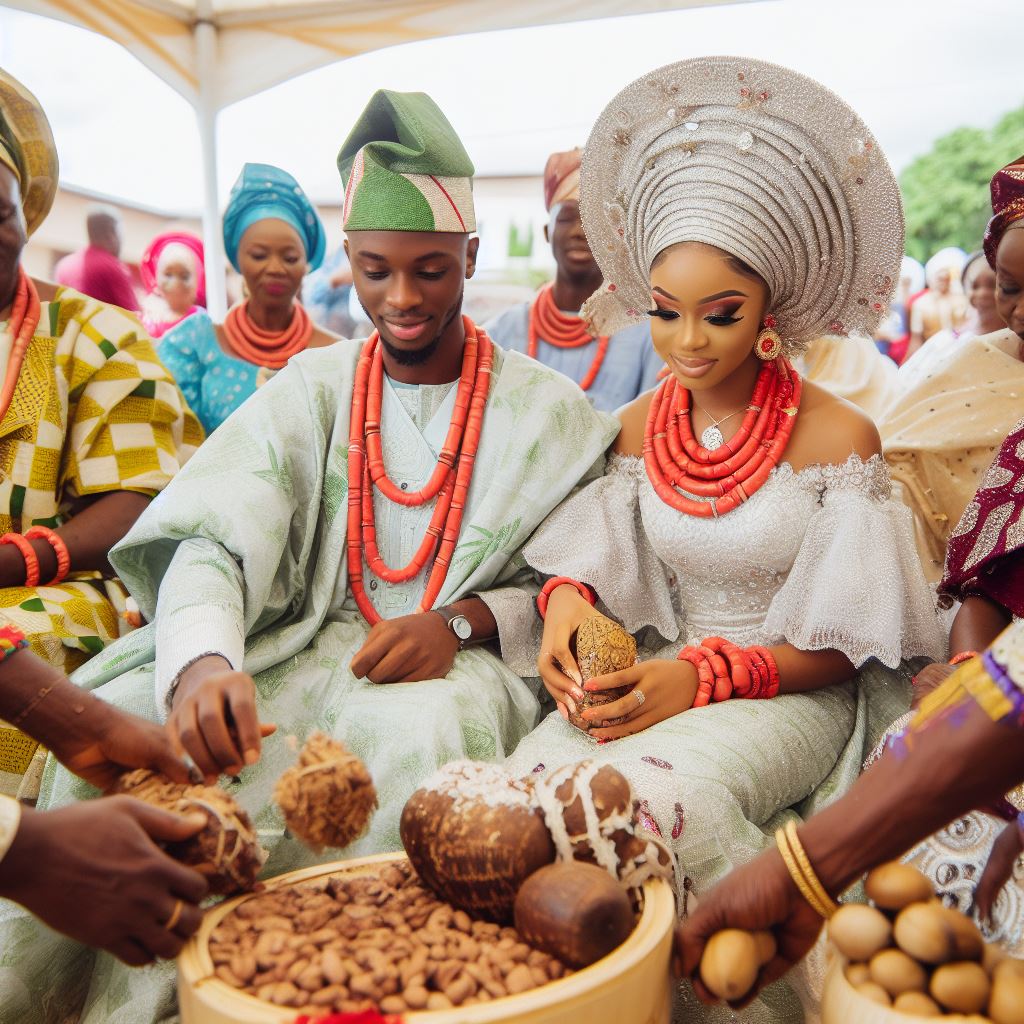
Food and Traditional Delicacies
Importance of food in Igbo culture and its significance during Igbankwu ceremonies
Food plays a significant role in Igbo culture and holds great importance during Igbankwu ceremonies.
The Igbos believe that food brings people together and fosters unity among family members and communities.
Traditional delicacies served during the event
Igbankwu involves preparing and serving traditional delicacies to celebrate the couple’s union.
- Pounded Yam: This staple food is made by boiling yam and pounding it into a smooth consistency. It is usually served with soups or stews.
- Ofe-Akwu (Palm Nut Soup): This delicious soup is made from the extract of palm nuts blended with various ingredients.
It is highly regarded and is often served as a symbol of goodwill and hospitality. - Kolanut: Kolanut holds great cultural significance in Igbo traditional marriages. It is offered as a form of welcome and blessing to the guests.
It is customary for the bride’s family to prepare and serve a variety of dishes to entertain their guests.
These delicacies are meticulously prepared to showcase the rich culinary heritage of the Igbo people.
The food serves as a way to honor the couple and their families, as well as to satisfy the appetites of the guests.
Every aspect of the Igbankwu ceremony revolves around the food, creating a festive atmosphere and promoting communal bonding.
hallenging traditional norms and values led to changes in conducting and perceiving marriages.
Furthermore, sharing a meal together strengthens the ties between the bride and groom’s families, fostering friendship and understanding.
The act of breaking bread symbolizes the couple’s willingness to share their lives and build a strong foundation together.
Traditional Igbo marriages emphasize the importance of communal harmony and the significance of shared meals.
Food acts as a medium for social interaction, where individuals from different backgrounds come together to celebrate love and unity.
Read: Heartfelt Marriage Prayers and Their Bible Origins
Weddings and Modern Influences
In the realm of Igbankwu ceremonies, we can’t escape the ever-encroaching winds of modernization. As the world evolves, so do our traditions, and Igbo traditional marriages are no exception.
With the rapid pace of change in today’s globalized world, many couples find themselves navigating the delicate balance between preserving cherished traditions and embracing contemporary influences.
This dichotomy is particularly evident in the realm of Igbankwu ceremonies.
Marriage of Traditions and Modernity
Modernization has brought about a host of changes, from shifts in societal values to advances in technology and communication.
These changes have inevitably seeped into the realm of marriage ceremonies, including Igbankwu.
Incorporating Western Elements
In the pursuit of a meaningful and memorable wedding experience, some couples opt to incorporate Western elements into their Igbankwu ceremonies.
This fusion of traditions can take many forms, from the choice of attire to the structure of the ceremony itself.
Preserving the Essence
While modernization has undoubtedly left its mark on Igbankwu ceremonies, it’s heartening to see that the essence of these cherished traditions remains intact.
The beauty and significance of Igbo traditional marriages continue to shine brightly, even in the face of change.
The Dance of Tradition and Modernity
In today’s world, where cultures intermingle and boundaries blur, Igbankwu ceremonies have become a dance of tradition and modernity.
Couples embrace this fusion, infusing their weddings with both timeless customs and contemporary elements.
Celebration of Love
Ultimately, what matters most in any wedding, including Igbankwu ceremonies, is the celebration of love.
Regardless of the influence of modernization or the blend of traditions, these weddings remain a testament to the enduring power of love and commitment.
Join us as we explore how modernization has influenced Igbankwu ceremonies and how couples are navigating the delicate balance between tradition and modernity on their special day.
Conclusion
In the tapestry of Nigerian cultural heritage, Igbankwu ceremonies shine as vibrant threads woven with beauty and tradition.
These celebrations encapsulate the essence of Igbo culture, radiating warmth and significance.
Igbankwu is more than a ceremony; it’s a cultural treasure, a testament to the rich tapestry of Nigerian traditions.
The elaborate attire, the rhythmic music, the sacred rituals—all converge to create an enchanting experience.
Preserving Igbankwu is preserving a part of Nigeria’s soul. It’s an acknowledgment of the enduring value of tradition in the face of modernity’s winds.
These ceremonies are a living testament to the deep-rooted culture and the importance of cherishing one’s heritage.
As we’ve delved into the beauty of Igbankwu, it’s evident that these ceremonies are more than just weddings; they are expressions of identity and cultural pride.
They symbolize unity, family, and love deeply rooted in Nigerian soil.
It’s essential to continue celebrating and preserving Igbankwu ceremonies, passing down these traditions to future generations.
They serve as a reminder of the beauty of diversity within Nigeria’s cultural mosaic and a source of pride for all Nigerians.
In the grand tapestry of Nigerian culture, Igbankwu ceremonies stand as vibrant threads woven with beauty, tradition, and cultural significance.
Let us continue to cherish and celebrate these extraordinary traditions, for they are the heartbeats of Nigeria’s rich cultural heritage.

